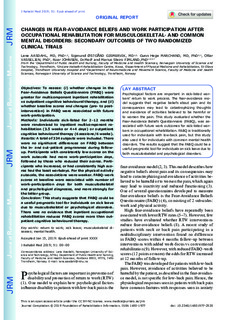| dc.contributor.author | Aasdahl, Lene | |
| dc.contributor.author | Gismervik, Sigmund Østgård | |
| dc.contributor.author | Marchand, Gunn Hege | |
| dc.contributor.author | Vasseljen, Ottar | |
| dc.contributor.author | Johnsen, Roar | |
| dc.contributor.author | Fimland, Marius Steiro | |
| dc.date.accessioned | 2019-03-11T15:51:04Z | |
| dc.date.available | 2019-03-11T15:51:04Z | |
| dc.date.created | 2019-02-19T10:18:07Z | |
| dc.date.issued | 2019 | |
| dc.identifier.issn | 1650-1977 | |
| dc.identifier.uri | http://hdl.handle.net/11250/2589638 | |
| dc.description.abstract | Objectives: To assess: (i) whether changes in the Fear-Avoidance Beliefs Questionnaire (FABQ) were greater for multicomponent inpatient rehabilitation vs outpatient cognitive behavioural therapy, and (ii) whether baseline scores and changes (pre- to post-intervention) in FABQ were associated with future work-participation.
Methods: Individuals sick-listed for 2–12 months were randomized to inpatient multicomponent rehabilitation (3.5 weeks or 4+4 days) or outpatient cognitive behavioural therapy (6 sessions/6 weeks).
Results: A total of 334 subjects were included. There were no significant differences on FABQ between the in- and out-patient programmes during follow-up. Participants with consistently low scores on the work subscale had more work-participation days, followed by those who reduced their scores. Participants who increased, or had consistently high scores had the least workdays. For the physical activity subscale, the associations were weaker. FABQ-work scores at baseline were associated with number of work-participation days for both musculoskeletal and psychological diagnoses, and more strongly for the latter group.
Conclusion: This study suggests that FABQ could be a useful prognostic tool for individuals on sick leave due to musculoskeletal or psychological disorders. There was no evidence that inpatient occupational rehabilitation reduces FABQ scores more than outpatient cognitive behavioural therapy. | nb_NO |
| dc.language.iso | eng | nb_NO |
| dc.publisher | Foundation for Rehabilitation Information | nb_NO |
| dc.rights | Navngivelse-Ikkekommersiell 4.0 Internasjonal | * |
| dc.rights.uri | http://creativecommons.org/licenses/by-nc/4.0/deed.no | * |
| dc.title | Changes in fear-avoidance beliefs and work participation after occupational rehabilitation for musculoskeletal- and common mental disorders: secondary outcomes of two randomized clinical trials | nb_NO |
| dc.type | Journal article | nb_NO |
| dc.type | Peer reviewed | nb_NO |
| dc.description.version | publishedVersion | nb_NO |
| dc.source.journal | Journal of Rehabilitation Medicine | nb_NO |
| dc.identifier.doi | 10.2340/16501977-2520 | |
| dc.identifier.cristin | 1678617 | |
| dc.relation.project | Norges forskningsråd: 238015 | nb_NO |
| dc.description.localcode | This is an open access article under the CC BY-NC license. © 2019 Foundation of Rehabilitation Information | nb_NO |
| cristin.unitcode | 194,65,20,0 | |
| cristin.unitcode | 194,65,30,0 | |
| cristin.unitname | Institutt for samfunnsmedisin og sykepleie | |
| cristin.unitname | Institutt for nevromedisin og bevegelsesvitenskap | |
| cristin.ispublished | true | |
| cristin.fulltext | original | |
| cristin.qualitycode | 1 | |

